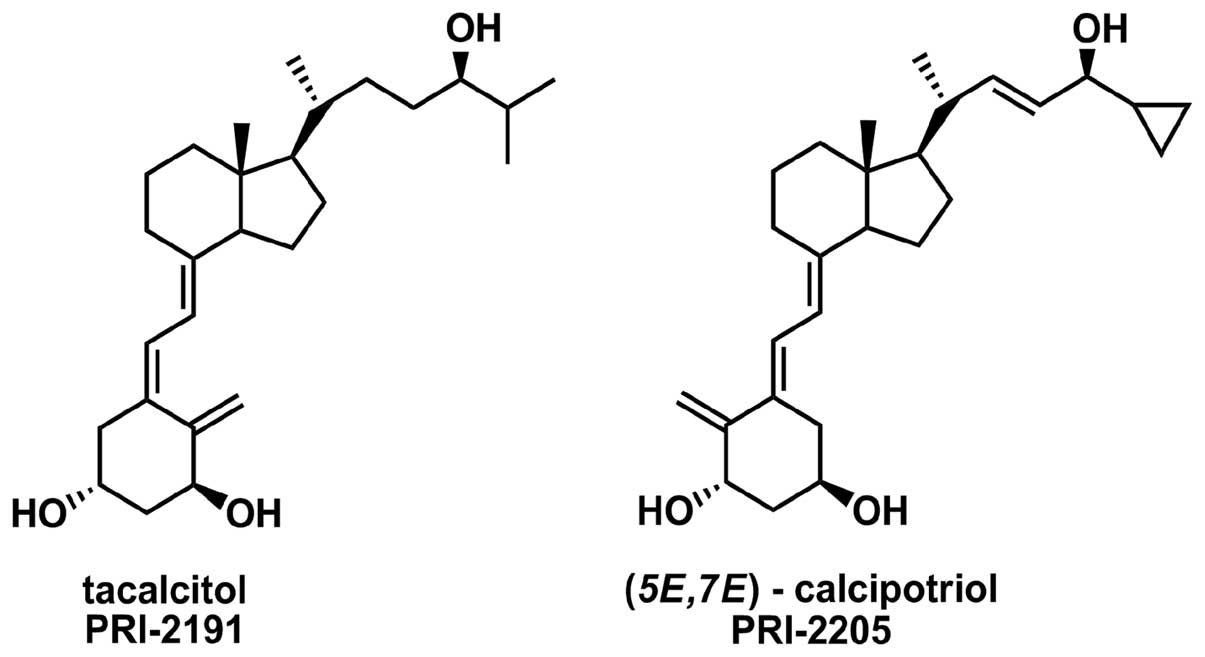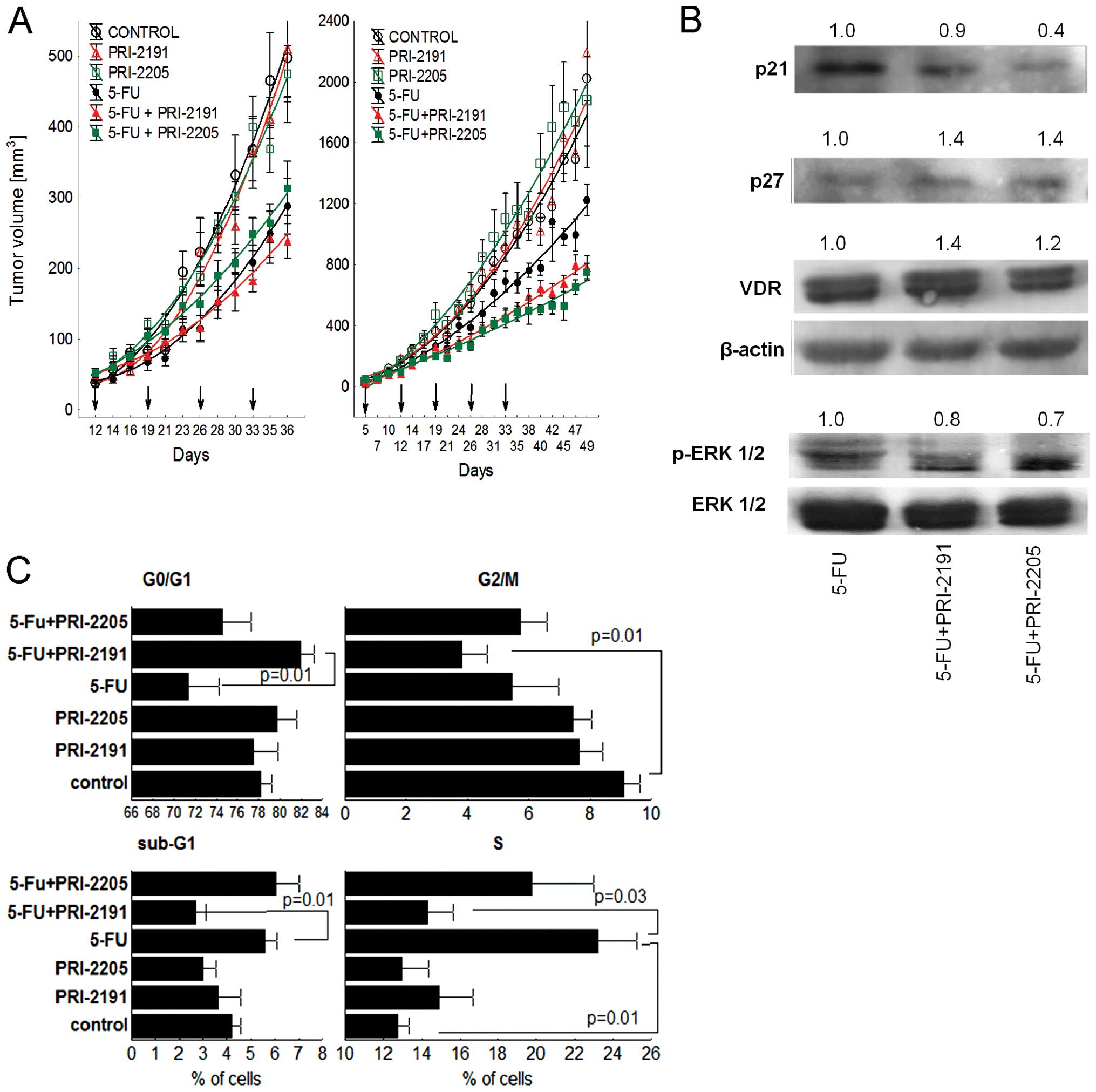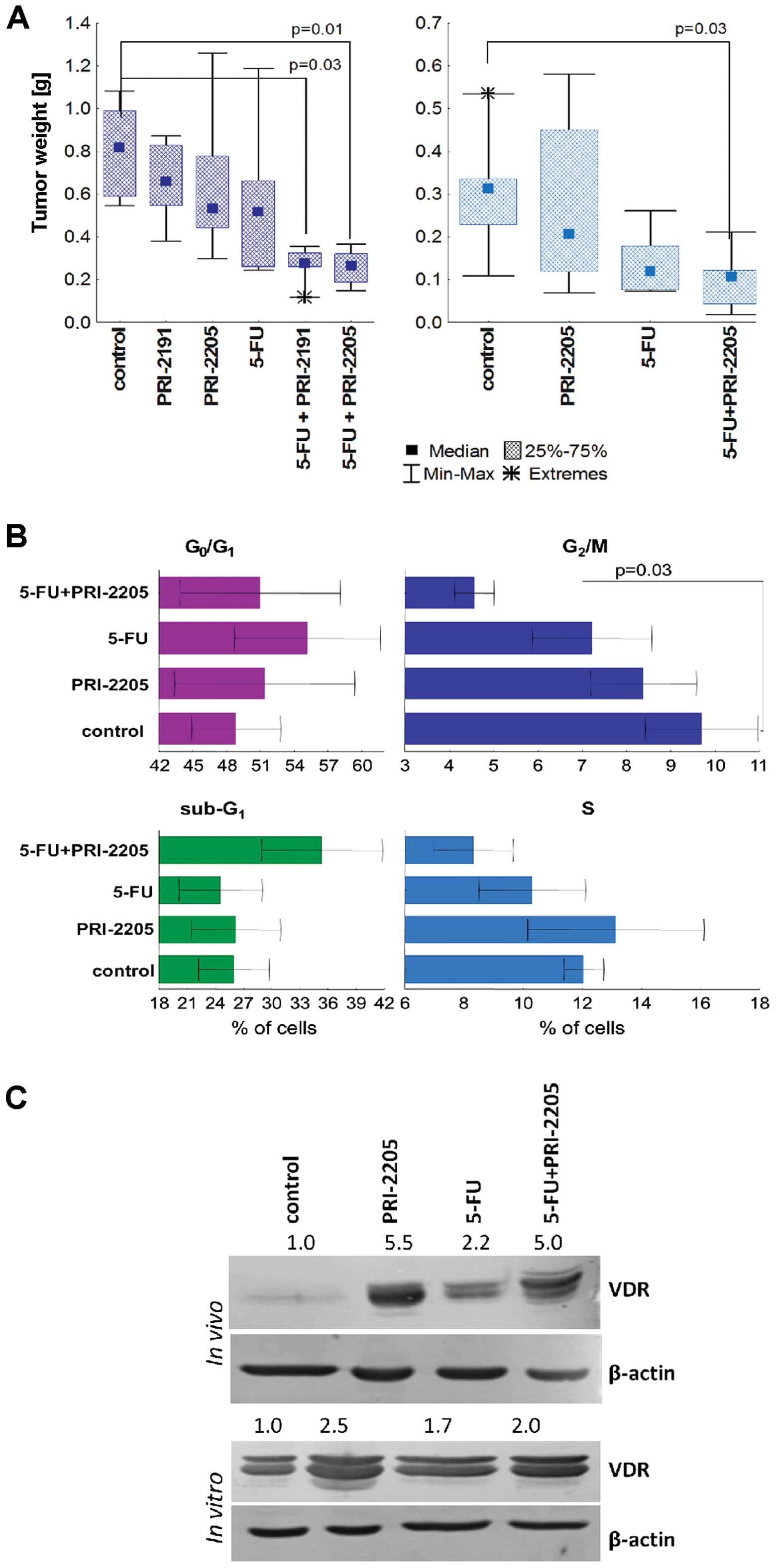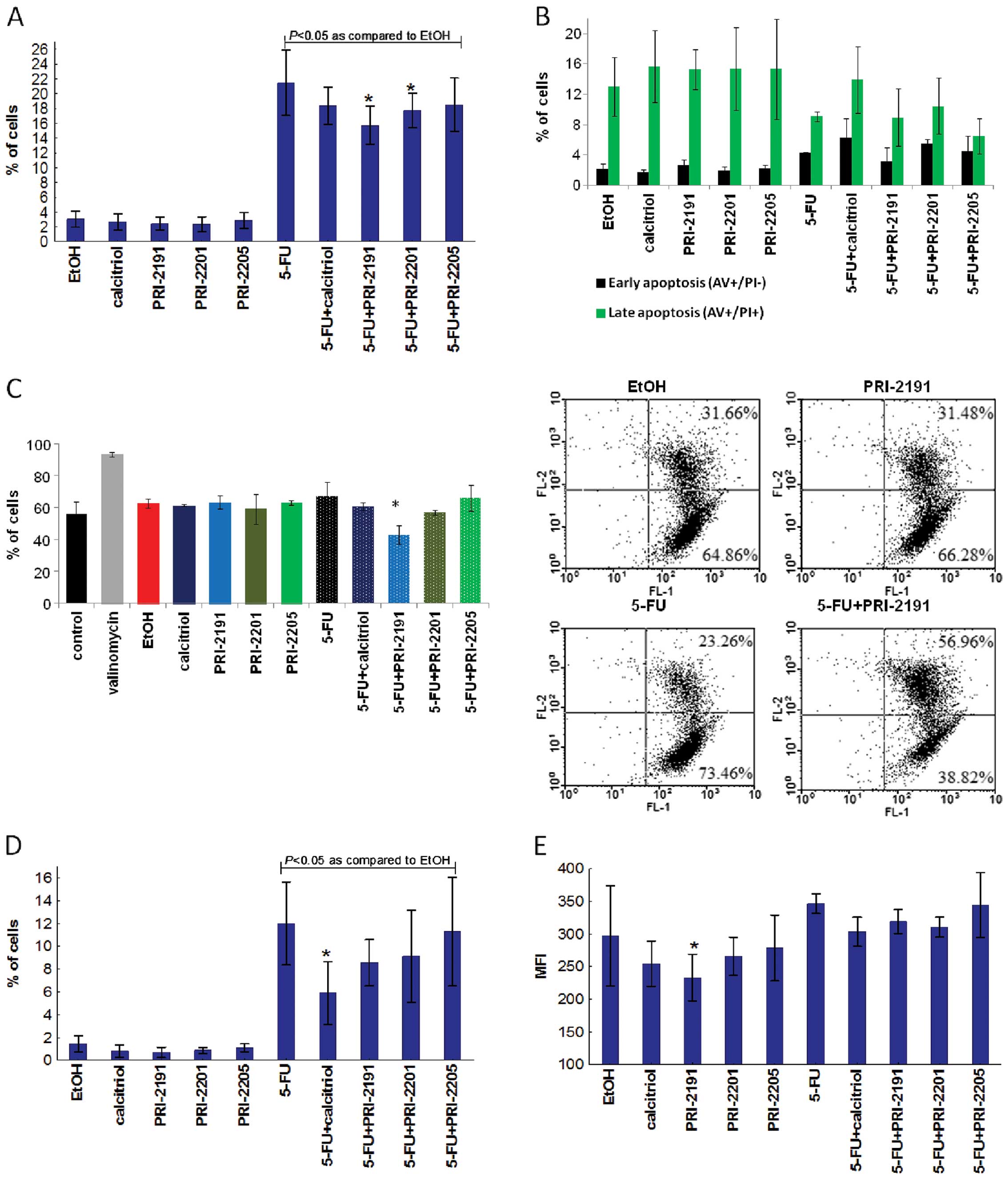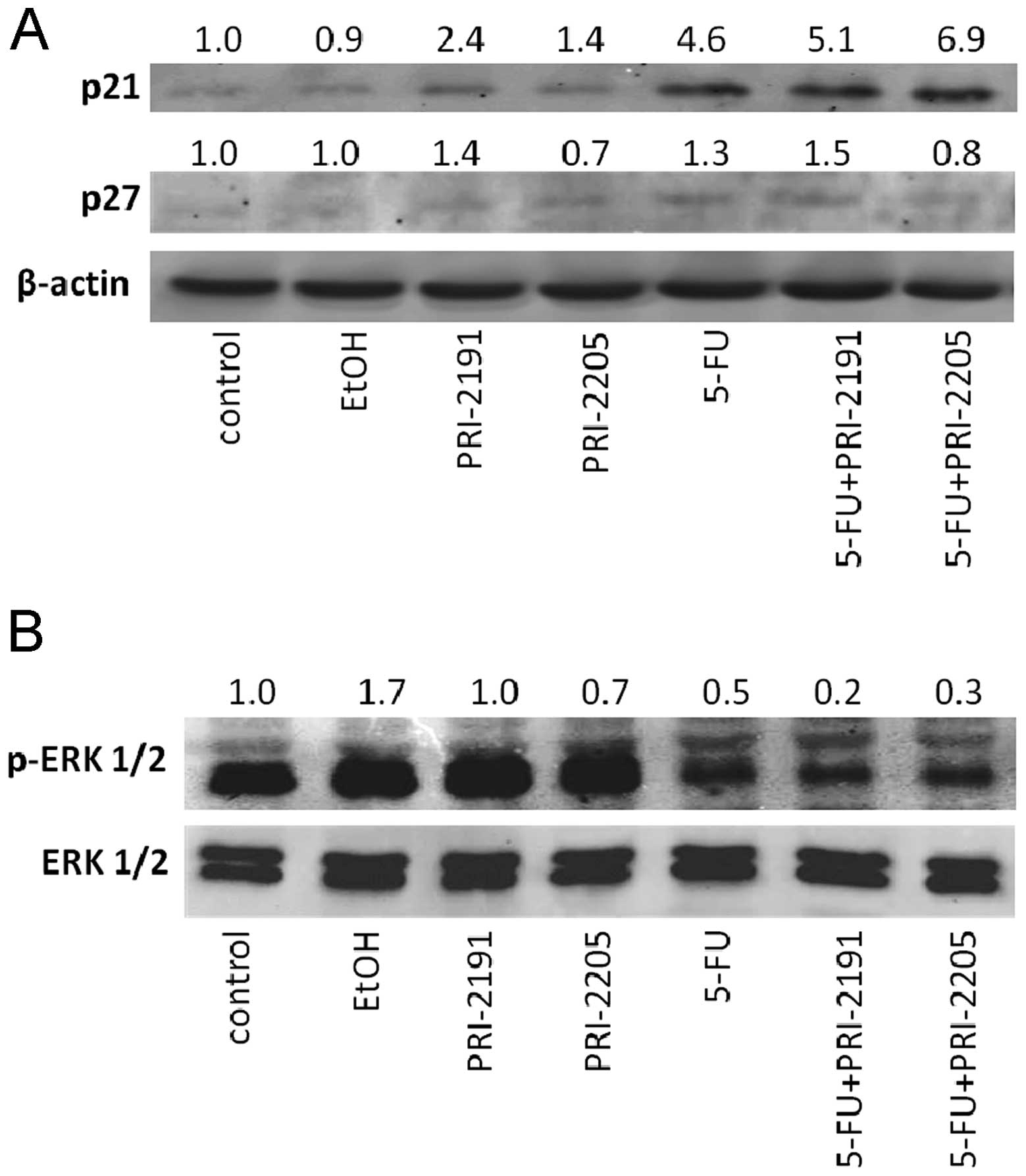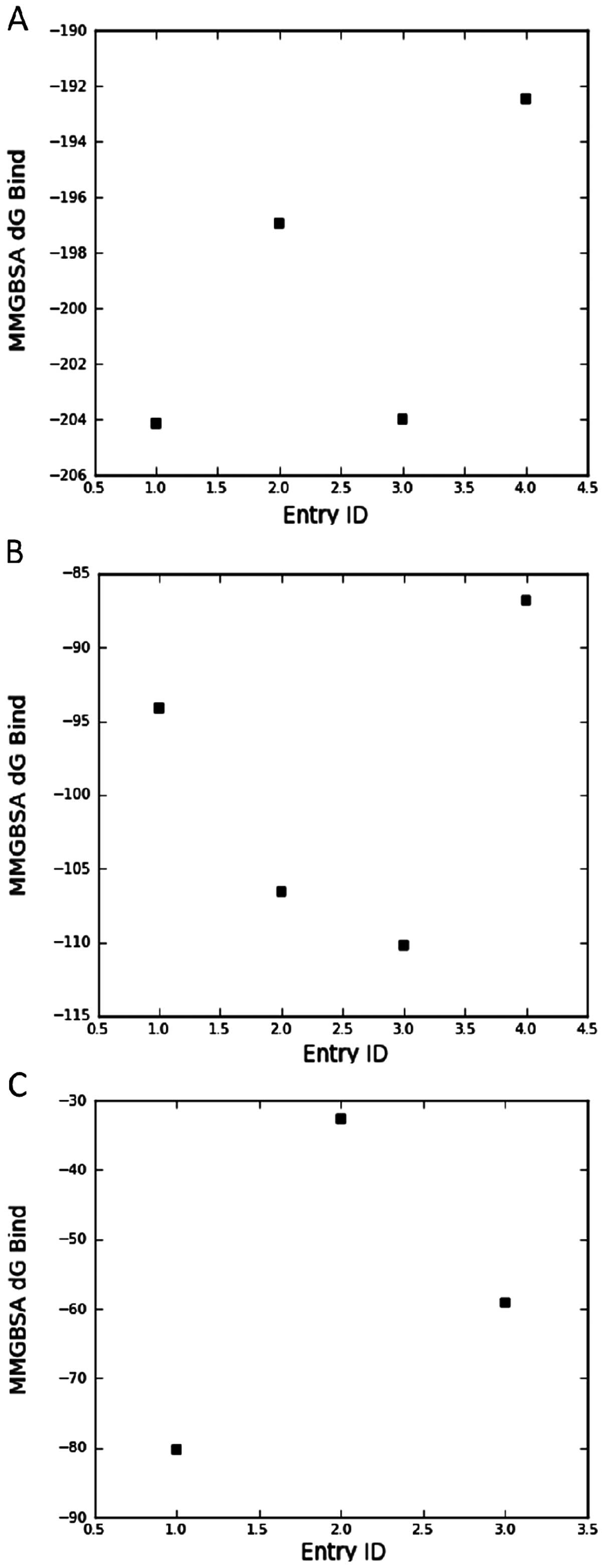|
1
|
Lamprecht SA and Lipkin M: Chemoprevention
of colon cancer by calcium, vitamin D and folate: molecular
mechanisms. Nat Rev Cancer. 3:601–614. 2003. View Article : Google Scholar : PubMed/NCBI
|
|
2
|
McCarthy TC, Li X and Sinal CJ: Vitamin D
receptor-dependent regulation of colon multidrug
resistance-associated protein 3 gene expression by bile acids. J
Biol Chem. 280:23232–23242. 2005. View Article : Google Scholar
|
|
3
|
Pritchard RS, Baron JA and Gerhardsson de
Verdier M: Dietary calcium, vitamin D, and the risk of colorectal
cancer in Stockholm, Sweden. Cancer Epidemiol Biomarkers Prev.
5:897–900. 1996.PubMed/NCBI
|
|
4
|
Terry P, Baron JA, Bergkvist L, Holmberg L
and Wolk A: Dietary calcium and vitamin D intake and risk of
colorectal cancer: a prospective cohort study in women. Nutr
Cancer. 43:39–46. 2002. View Article : Google Scholar : PubMed/NCBI
|
|
5
|
Berkovich L, Sintov AC and Ben-Shabat S:
Inhibition of cancer growth and induction of apoptosis by BGP-13
and BGP-15, new calcipotriene-derived vitamin D3analogs,
in-vitro and in-vivo studies. Invest New Drugs. 31:247–255. 2013.
View Article : Google Scholar : PubMed/NCBI
|
|
6
|
Grau MV, Baron JA, Sandler RS, Haile RW,
Beach ML, Church TR and Heber D: Vitamin D, calcium
supplementation, and colorectal adenomas: results of a randomized
trial. J Natl Cancer Inst. 95:1765–1771. 2003. View Article : Google Scholar : PubMed/NCBI
|
|
7
|
Hartman TJ, Albert PS, Snyder K, Slattery
ML, Caan B, Paskett E, Iber F, Kikendall JW, Marshall J, Shike M,
Weissfeld J, Brewer B, Schatzkin A and Lanza E: The association of
calcium and vitamin D with risk of colorectal adenomas. J Nutr.
135:252–259. 2005.PubMed/NCBI
|
|
8
|
Baniahmad A and Tsai MJ: Mechanisms of
transcriptional activation by steroid hormone receptors. J Cell
Biochem. 51:151–156. 1993. View Article : Google Scholar : PubMed/NCBI
|
|
9
|
Nagpal S, Na S and Rathnachalam R:
Noncalcemic actions of vitamin D receptor ligands. Endocr Rev.
26:662–687. 2005. View Article : Google Scholar : PubMed/NCBI
|
|
10
|
Saramaki A, Banwell CM, Campbell MJ and
Carlberg C: Regulation of the human p21 (waf1/cip1) gene promoter
via multiple binding sites for p53 and the vitamin
D3receptor. Nucleic Acids Res. 34:543–554. 2006.
View Article : Google Scholar : PubMed/NCBI
|
|
11
|
Alvarez-Diaz S, Valle N, Ferrer-Mayorga G,
Lombardia L, Herrera M, Dominguez O, Segura MF, Bonilla F, Hernando
E and Munoz A: MicroRNA-22 is induced by vitamin D and contributes
to its antiproliferative, antimigratory and gene regulatory effects
in colon cancer cells. Hum Mol Genet. 21:2157–2165. 2012.
View Article : Google Scholar : PubMed/NCBI
|
|
12
|
Matusiak D, Murillo G, Carroll RE, Mehta
RG and Benya RV: Expression of vitamin D receptor and
25-hydroxyvitamin D3-1{alpha}-hydroxylase in normal and malignant
human colon. Cancer Epidemiol Biomarkers Prev. 14:2370–2376.
2005.
|
|
13
|
Tangpricha V, Spina C, Yao M, Chen TC,
Wolfe MM and Holick MF: Vitamin D deficiency enhances the growth of
MC-26 colon cancer xenografts in Balb/c mice. J Nutr.
135:2350–2354. 2005.PubMed/NCBI
|
|
14
|
Mokady E, Schwartz B, Shany S and
Lamprecht SA: A protective role of dietary vitamin D3in
rat colon carcinogenesis. Nutr Cancer. 38:65–73. 2000. View Article : Google Scholar : PubMed/NCBI
|
|
15
|
Hummel DM, Thiem U, Hobaus J, Mesteri I,
Gober L, Stremnitzer C, Graca J, Obermayer-Pietsch B and Kallay E:
Prevention of preneoplastic lesions by dietary vitamin D in a mouse
model of colorectal carcinogenesis. J Steroid Biochem Mol Biol.
136:284–288. 2013. View Article : Google Scholar : PubMed/NCBI
|
|
16
|
Larriba MJ, Ordonez-Moran P, Chicote I,
Martin-Fernandez G, Puig I, Munoz A and Palmer HG: Vitamin D
receptor deficiency enhances Wnt/β-catenin signaling and tumor
burden in colon cancer. PLoS ONE. 6:e235242011.PubMed/NCBI
|
|
17
|
Cho YL, Christensen C, Saunders DE,
Lawrence WD, Deppe G, Malviya VK and Malone JM: Combined effects of
1,25-dihydroxyvitamin D3 and platinum drugs on the
growth of MCF-7 cells. Cancer Res. 51:2848–2853. 1991.PubMed/NCBI
|
|
18
|
Ravid A, Rocker D, Machlenkin A, Rotem C,
Hochman A, Kessler-Icekson G, Liberman UA and Koren R:
1,25-Dihydroxyvitamin D3 enhances the susceptibility of breast
cancer cells to doxorubicin-induced oxidative damage. Cancer Res.
59:862–867. 1999.PubMed/NCBI
|
|
19
|
Siwinska A, Opolski A, Chrobak A, Wietrzyk
J, Wojdat E, Kutner A, Szelejewski W and Radzikowski C:
Potentiation of the antiproliferative effect in vitro of
doxorubicin, cisplatin and genistein by new analogues of vitamin D.
Anticancer Res. 21:1925–1929. 2001.PubMed/NCBI
|
|
20
|
Pelczynska M, Switalska M, Maciejewska M,
Jaroszewicz I, Kutner A and Opolski A: Antiproliferative activity
of vitamin D compounds in combination with cytostatics. Anticancer
Res. 26:2701–2705. 2006.PubMed/NCBI
|
|
21
|
Opolski A, Wietrzyk J, Siwinska A,
Marcinkowska E, Chrobak A, Radzikowski C and Kutner A: Biological
activity in vitro of side-chain modified analogues of calcitriol.
Curr Pharm Des. 6:755–765. 2000. View Article : Google Scholar : PubMed/NCBI
|
|
22
|
Kota BP, Allen JD and Roufogalis BD: The
effect of vitamin D3and ketoconazole combination on
VDR-mediated P-gp expression and function in human colon
adenocarcinoma cells: implications in drug disposition and
resistance. Basic Clin Pharmacol Toxicol. 109:97–102. 2011.
|
|
23
|
Abe J, Nakano T, Nishii Y, Matsumoto T,
Ogata E and Ikeda K: A novel vitamin D3analog,
22-oxa-1,25-dihydroxyvitamin D3, inhibits the growth of human
breast cancer in vitro and in vivo without causing hypercalcemia.
Endocrinology. 129:832–837. 1991.
|
|
24
|
Abe-Hashimoto J, Kikuchi T, Matsumoto T,
Nishii Y, Ogata E and Ikeda K: Antitumor effect of
22-oxa-calcitriol, a noncalcemic analogue of calcitriol, in athymic
mice implanted with human breast carcinoma and its synergism with
tamoxifen. Cancer Res. 53:2534–2537. 1993.PubMed/NCBI
|
|
25
|
Chodyński M, Wietrzyk J, Marcinkowska E,
Opolski A, Szelejewski W and Kutner A: Synthesis and
antiproliferative activity of side-chain unsaturated and
homologated analogs of 1,25-dihydroxyvitamin D(2).
(24E)-(1S)-24-Dehydro-24a-homo-1,25-dihydroxyergocalciferol and
congeners. Steroids. 67:789–798. 2002.PubMed/NCBI
|
|
26
|
Wietrzyk J, Chodynski M, Fitak H, Wojdat
E, Kutner A and Opolski A: Antitumor properties of diastereomeric
and geometric analogs of vitamin D3. Anticancer Drugs.
18:447–457. 2007. View Article : Google Scholar : PubMed/NCBI
|
|
27
|
Wietrzyk J, Nevozhay D, Filip B, Milczarek
M and Kutner A: The antitumor effect of lowered doses of
cytostatics combined with new analogs of vitamin D in mice.
Anticancer Res. 27:3387–3398. 2007.PubMed/NCBI
|
|
28
|
Wietrzyk J, Pelczynska M, Madej J, Dzimira
S, Kusnierczyk H, Kutner A, Szelejewski W and Opolski A: Toxicity
and antineoplastic effect of (24R)-1,24-dihydroxyvitamin D3
(PRI-2191). Steroids. 69:629–635. 2004. View Article : Google Scholar : PubMed/NCBI
|
|
29
|
Wietrzyk J, Nevozhay D, Milczarek M, Filip
B and Kutner A: Toxicity and antitumor activity of the vitamin D
analogs PRI-1906 and PRI-1907 in combined treatment with
cyclophosphamide in a mouse mammary cancer model. Cancer Chemother
Pharmacol. 62:787–797. 2008. View Article : Google Scholar : PubMed/NCBI
|
|
30
|
Milczarek M, Rosinska S, Psurski M,
Maciejewska M, Kutner A and Wietrzyk J: Combined colonic cancer
treatment with vitamin D analogs and irinotecan or oxaliplatin.
Anticancer Res. 33:433–444. 2013.PubMed/NCBI
|
|
31
|
Lowe SW, Bodis S, McClatchey A, Remington
L, Ruley HE, Fisher DE, Housman DE and Jacks T: p53 status and the
efficacy of cancer therapy in vivo. Science. 266:807–810. 1994.
View Article : Google Scholar : PubMed/NCBI
|
|
32
|
Sun XX, Dai MS and Lu H: 5-fluorouracil
activation of p53 involves an MDM2-ribosomal protein interaction. J
Biol Chem. 282:8052–8059. 2007. View Article : Google Scholar : PubMed/NCBI
|
|
33
|
Chakrabarty S, Radjendirane V, Appelman H
and Varani J: Extracellular calcium and calcium sensing receptor
function in human colon carcinomas: promotion of E-cadherin
expression and suppression of beta-catenin/TCF activation. Cancer
Res. 63:67–71. 2003.
|
|
34
|
Bhagavathula N, Hanosh AW, Nerusu KC,
Appelman H, Chakrabarty S and Varani J: Regulation of E-cadherin
and beta-catenin by Ca2+in colon carcinoma is dependent
on calcium-sensing receptor expression and function. Int J Cancer.
121:1455–1462. 2007.PubMed/NCBI
|
|
35
|
Chakrabarty S, Wang H, Canaff L, Hendy GN,
Appelman H and Varani J: Calcium sensing receptor in human colon
carcinoma: interaction with Ca2+and
1,25-dihydroxyvitamin D3. Cancer Res. 65:493–498.
2005.PubMed/NCBI
|
|
36
|
Wang X, Chen W, Singh N, Promkan M and Liu
G: Effects of potential calcium sensing receptor inducers on
promoting chemosensitivity of human colon carcinoma cells. Int J
Oncol. 36:1573–1580. 2010.PubMed/NCBI
|
|
37
|
Liu G, Hu X and Chakrabarty S: Vitamin D
mediates its action in human colon carcinoma cells in a
calcium-sensing receptor-dependent manner: downregulates malignant
cell behavior and the expression of thymidylate synthase and
survivin and promotes cellular sensitivity to 5-FU. Int J Cancer.
126:631–639. 2010. View Article : Google Scholar
|
|
38
|
Peters GJ, van der Wilt CL, van Moorsel
CJ, Kroep JR, Bergman AM and Ackland SP: Basis for effective
combination cancer chemotherapy with antimetabolites. Pharmacol
Ther. 87:227–253. 2000. View Article : Google Scholar : PubMed/NCBI
|
|
39
|
Kim R, Emi M, Tanabe K, Uchida Y and
Arihiro K: The role of apoptotic or nonapoptotic cell death in
determining cellular response to anticancer treatment. Eur J Surg
Oncol. 32:269–277. 2006. View Article : Google Scholar : PubMed/NCBI
|
|
40
|
Sastry GM, Adzhigirey M, Day T,
Annabhimoju R and Sherman W: Protein and ligand preparation:
parameters, protocols, and influence on virtual screening
enrichments. J Comput Aided Mol Des. 27:221–234. 2013. View Article : Google Scholar : PubMed/NCBI
|
|
41
|
Friesner RA, Murphy RB, Repasky MP, Frye
LL, Greenwood JR, Halgren TA, Sanschagrin PC and Mainz DT: Extra
precision glide: docking and scoring incorporating a model of
hydrophobic enclosure for protein-ligand complexes. J Med Chem.
49:6177–6196. 2006. View Article : Google Scholar : PubMed/NCBI
|
|
42
|
Halgren TA, Murphy RB, Friesner RA, Beard
HS, Frye LL, Pollard WT and Banks JL: Glide: a new approach for
rapid, accurate docking and scoring. 2. Enrichment factors in
database screening. J Med Chem. 47:1750–1759. 2004. View Article : Google Scholar : PubMed/NCBI
|
|
43
|
Friesner RA, Banks JL, Murphy RB, Halgren
TA, Klicic JJ, Mainz DT, Repasky MP, Knoll EH, Shelley M, Perry JK,
Shaw DE, Francis P and Shenkin PS: Glide: a new approach for rapid,
accurate docking and scoring. 1. Method and assessment of docking
accuracy. J Med Chem. 47:1739–1749. 2004. View Article : Google Scholar : PubMed/NCBI
|
|
44
|
Li J, Abel R, Zhu K, Cao Y, Zhao S and
Friesner RA: The VSGB 2.0 model: a next generation energy model for
high resolution protein structure modeling. Proteins. 79:2794–2812.
2011. View Article : Google Scholar : PubMed/NCBI
|
|
45
|
Hou T, Wang J, Li Y and Wang W: Assessing
the performance of the MM/PBSA and MM/GBSA methods. 1. The accuracy
of binding free energy calculations based on molecular dynamics
simulations. J Chem Inf Model. 51:69–82. 2011. View Article : Google Scholar : PubMed/NCBI
|
|
46
|
Hou T, Wang J, Li Y and Wang W: Assessing
the performance of the molecular mechanics/Poisson Boltzmann
surface area and molecular mechanics/generalized Born surface area
methods. II. The accuracy of ranking poses generated from docking.
J Comput Chem. 32:866–877. 2011. View Article : Google Scholar : PubMed/NCBI
|
|
47
|
Rastelli G, Del Rio A, Degliesposti G and
Sgobba M: Fast and accurate predictions of binding free energies
using MM-PBSA and MM-GBSA. J Comput Chem. 31:797–810.
2010.PubMed/NCBI
|
|
48
|
Danilenko M and Studzinski GP: Enhancement
by other compounds of the anti-cancer activity of vitamin
D3and its analogs. Exp Cell Res. 298:339–358. 2004.
View Article : Google Scholar : PubMed/NCBI
|
|
49
|
Milczarek M, Psurski M, Kutner A and
Wietrzyk J: Vitamin D analogs enhance the anticancer activity of
5-fluorouracil in an in vivo mouse colon cancer model. BMC Cancer.
13:2942013. View Article : Google Scholar : PubMed/NCBI
|
|
50
|
Zhao X and Feldman D: Regulation of
vitamin D receptor abundance and responsiveness during
differentiation of HT-29 human colon cancer cells. Endocrinology.
132:1808–1814. 1993.PubMed/NCBI
|
|
51
|
Gaschott T, Werz O, Steinmeyer A,
Steinhilber D and Stein J: Butyrate-induced differentiation of
Caco-2 cells is mediated by vitamin D receptor. Biochem Biophys Res
Commun. 288:690–696. 2001. View Article : Google Scholar : PubMed/NCBI
|
|
52
|
Palmer HG, Gonzalez-Sancho JM, Espada J,
Berciano MT, Puig I, Baulida J, Quintanilla M, Cano A, de Herreros
AG, Lafarga M and Munoz A: Vitamin D(3) promotes the
differentiation of colon carcinoma cells by the induction of
E-cadherin and the inhibition of beta-catenin signaling. J Cell
Biol. 154:369–387. 2001. View Article : Google Scholar : PubMed/NCBI
|
|
53
|
Wietrzyk J, Opolski A, Madej J and
Radzikowski C: Antitumour and antimetastatic effect of genistein
alone or combined with cyclophosphamide in mice transplanted with
various tumours depends on the route of tumour transplantation. In
Vivo. 14:357–362. 2000.
|
|
54
|
Hidalgo AA, Paredes R, Garcia VM, Flynn G,
Johnson CS, Trump DL and Onate SA: Altered VDR-mediated
transcriptional activity in prostate cancer stroma. J Steroid
Biochem Mol Biol. 103:731–736. 2007. View Article : Google Scholar : PubMed/NCBI
|
|
55
|
Spina CS, Tangpricha V, Uskokovic M,
Adorinic L, Maehr H and Holick MF: Vitamin D and cancer. Anticancer
Res. 26:2515–2524. 2006.
|
|
56
|
Tocchini-Valentini G, Rochel N, Wurtz JM
and Moras D: Crystal structures of the vitamin D nuclear receptor
liganded with the vitamin D side chain analogues calcipotriol and
secocalcitol, receptor agonists of clinical importance. Insights
into a structural basis for the switching of calcipotriol to a
receptor antagonist by further side chain modification. J Med Chem.
47:1956–1961. 2004.
|
|
57
|
Matsunaga T, Yamamoto M, Mimura H, Ohta T,
Kiyoki M, Ohba T, Naruchi T, Hosoi J and Kuroki T:
1,24(R)-dihydroxyvitamin D3, a novel active form of vitamin D3 with
high activity for inducing epidermal differentiation but decreased
hypercalcemic activity. J Dermatol. 17:135–142. 1990.
|
|
58
|
Bouillon R, Allewaert K, Xiang DZ, Tan BK
and van Baelen HJ: Vitamin D analogs with low affinity for the
vitamin D binding protein: enhanced in vitro and decreased in vivo
activity. J Bone Miner Res. 6:1051–1057. 1991. View Article : Google Scholar : PubMed/NCBI
|
|
59
|
Xu RX, Lambert MH, Wisely BB, et al: A
structural basis for constitutive activity in the human
CAR/RXRalpha heterodimer. Mol Cell. 16:919–928. 2004. View Article : Google Scholar : PubMed/NCBI
|
|
60
|
Wu B, Li S and Dong D: 3D structures and
ligand specificities of nuclear xenobiotic receptors CAR, PXR and
VDR. Drug Discov Today. 18:574–581. 2013. View Article : Google Scholar : PubMed/NCBI
|
|
61
|
Sutton AL and MacDonald PN: Vitamin D:
more than a ‘bone-a-fide’ hormone. Mol Endocrinol. 17:777–791.
2003.
|
|
62
|
Moreau A, Maurel P, Vilarem MJ and
Pascussi JM: Constitutive androstane receptor-vitamin D receptor
crosstalk: consequence on CYP24 gene expression. Biochem Biophys
Res Commun. 360:76–82. 2007. View Article : Google Scholar : PubMed/NCBI
|
|
63
|
Cheng HT, Chen JY, Huang YC, Chang HC and
Hung WC: Functional role of VDR in the activation of p27Kip1 by the
VDR/Sp1 complex. J Cell Biochem. 98:1450–1456. 2006. View Article : Google Scholar : PubMed/NCBI
|
|
64
|
Huang YC, Chen JY and Hung WC: Vitamin D3
receptor/Sp1 complex is required for the induction of p27Kip1
expression by vitamin D3. Oncogene. 23:4856–4861. 2004. View Article : Google Scholar : PubMed/NCBI
|
|
65
|
Diaz GD, Paraskeva C, Thomas MG, Binderup
L and Hague A: Apoptosis is induced by the active metabolite of
vitamin D3 and its analogue EB1089 in colorectal adenoma and
carcinoma cells: possible implications for prevention and therapy.
Cancer Res. 60:2304–2312. 2000.PubMed/NCBI
|
|
66
|
Koren R, Wacksberg S, Weitsman GE and
Ravid A: Calcitriol sensitizes colon cancer cells to
H2O2-induced cytotoxicity while inhibiting
caspase activation. J Steroid Biochem Mol Biol. 101:151–160. 2006.
View Article : Google Scholar : PubMed/NCBI
|
|
67
|
Meng J, Zhang HH, Zhou CX, Li C, Zhang F
and Mei QB: The histone deacetylase inhibitor trichostatin A
induces cell cycle arrest and apoptosis in colorectal cancer cells
via p53-dependent and -independent pathways. Oncol Rep. 28:384–388.
2012.PubMed/NCBI
|
|
68
|
Stambolsky P, Tabach Y, Fontemaggi G,
Weisz L, Maor-Aloni R, Siegfried Z, Shiff I, Kogan I, Shay M, Kalo
E, Blandino G, Simon I, Oren M and Rotter V: Modulation of the
vitamin D3 response by cancer-associated mutant p53. Cancer Cell.
17:273–285. 2010. View Article : Google Scholar : PubMed/NCBI
|
|
69
|
Longley DB, Harkin DP and Johnston PG:
5-fluorouracil: mechanisms of action and clinical strategies. Nat
Rev Cancer. 3:330–338. 2003. View Article : Google Scholar : PubMed/NCBI
|
|
70
|
Shah MA and Schwartz GK: Cell
cycle-mediated drug resistance: an emerging concept in cancer
therapy. Clin Cancer Res. 7:2168–2181. 2001.PubMed/NCBI
|
|
71
|
Mader RM, Muler M and Steger G: Resistance
to 5-fluorouracil. Gen Pharmacol. 31:661–666. 1998. View Article : Google Scholar
|
|
72
|
Takagi K, Sowa Y, Cevik OM, Nakanishi R
and Sakai T: CDK inhibitor enhances the sensitivity to
5-fluorouracil in colorectal cancer cells. Int J Oncol.
32:1105–1110. 2008.PubMed/NCBI
|
|
73
|
Watanabe M, Sowa Y, Yogosawa M and Sakai
T: Novel MEK inhibitor trametinib and other retinoblastoma gene
(RB)-reactivating agents enhance efficacy of 5-fluorouracil on
human colon cancer cells. Cancer Sci. 104:687–693. 2013. View Article : Google Scholar : PubMed/NCBI
|















